|
|
|
Sort Order |
|
|
|
Items / Page
|
|
|
|
|
|
|
| Srl | Item |
| 1 |
ID:
115329
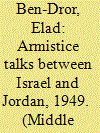

|
|
|
|
|
| Publication |
2012.
|
| Summary/Abstract |
The article examines the armistice talks between Israel and Jordan (March-April 1949) from the perspective of the UN mediator, Ralph Bunche, who coordinated them. The period described was stormy and complex: at its start, Israel took control of the southern Negev. Later, the two countries conducted formal talks in Rhodes, under Bunche's watchful eye, in parallel to informal negotiations, without UN involvement, in Jordan. The article, based to a large extent on Bunche's unpublished diary, explains why Bunche, who maintained rigorous control of all of the other armistice talks, behaved differently in this case, giving his post factum seal of approval to the Israeli takeover of the southern Negev and allowing Israel to pressure Abdullah to hand over the Triangle. The thesis is that Bunche, who could have put an end to the talks by resigning, or drawn the US into the crisis (as he did in the other rounds of negotiations), recognized the complexity of the relations between Israel and Abdullah and chose to act in a way that would prevent a new eruption of hostilities. In effect he was protecting Abdullah, who would have been likely to lose the West Bank to Israel in another round of fighting.
|
|
|
|
|
|
|
|
|
|
|
|
|
|
|
|
| 2 |
ID:
142873


|
|
|
|
|
| Summary/Abstract |
From 1948 to 1950, the United Nations (UN) endeavoured to promote the internationalisation of Jerusalem, which had been a key element of the 1947 Palestine “Partition Plan.” Even though the war that erupted in Palestine in 1948 put paid to partition, 2 UN resolutions re-affirmed the decision to place the city under international auspices. On the opposite side stood Israel and Jordan, both of which ruled the city and were interested in frustrating the attempt to remove it from their control. This identity of interests stirred them to try to reach agreement to divide Jerusalem and make internationalisation superfluous. Unlike other studies that examine the contacts between Israel and Jordan during this period, this analysis examines the Jerusalem question as an independent issue and focuses on the moves made by Israel and Jordan during their covert negotiations in light of the UN decision to internationalise the city.
|
|
|
|
|
|
|
|
|
|
|
|
|
|
|
|
| 3 |
ID:
183489
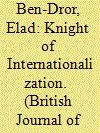

|
|
|
|
|
| Summary/Abstract |
On 9 December 1949, the United Nations General Assembly adopted Resolution 303 calling for the full internationalization of Jerusalem although many had grave doubts about the viability of the plan and a more practical alternative focusing on the holy places was then sitting on the table. This article sheds light on the diplomacy of Charles Malik, Lebanon’s U.N. representative, whose tireless efforts were responsible in large measure for the adoption of this resolution.
|
|
|
|
|
|
|
|
|
|
|
|
|
|
|
|
| 4 |
ID:
144933
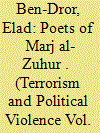

|
|
|
|
|
| Summary/Abstract |
In December 1992, after the kidnapping and murder of a policeman, Israel deported 415 members of Hamas and Islamic Jihad to Lebanon. Most were affiliated with the Hamas political apparatus and had not been involved in terrorism. The deportees decided to stay together and set up a camp in Marj al-Zuhur in southern Lebanon. Here they engaged in study and various cultural pursuits—including poetry writing. Roughly a dozen of the deportees wrote poetry. The poems were read aloud at gatherings in the camp and published in the Arab press. Their main function was to raise the residents’ spirits and keep their plight in the public eye. They incorporate the expected political messages: anger at Israel and criticism of the international community, the Palestinian leadership, and the Arab states, which were prodded to work harder for the deportees’ return. The poetry was part of a successful media and information campaign, which annoyed Israel so much that it allowed all the deportees to return home by December 1993. Some of the poems were later published and helped cultivate the myth of the Marj al-Zuhur deportation, which Hamas viewed as a victory and symbol of steadfast resistance to Israel.
|
|
|
|
|
|
|
|
|
|
|
|
|
|
|
|
| 5 |
ID:
174154
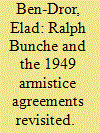

|
|
|
|
|
| Summary/Abstract |
The African American UN mediator Ralph Bunche ended the 1948 Arab-Israeli war by getting the combatants to sign armistice agreements. Awarded the Nobel Peace Prize in 1950, Bunche became an international hero, acclaimed as the outstanding mediator of the Arab-Israeli conflict. This impression emerged almost immediately; everything written over the years corroborated it. But studies published after the turn of the century propagated a different view of Bunche as a weak mediator, manipulated by the Israelis and Americans. The present article, drawing on materials from archives and other sources (some of them available only in Hebrew), including new knowledge about Israeli plans for military operations while the talks were in progress (most of them remained on paper), casts a different light on those months. Analysing Bunche’s role in the negotiations (principally with Egypt and with Jordan), it shows that he ran the talks objectively and skilfully and prevented a renewal of the fighting – which would have resulted in an overwhelming Israeli victory, at the expense of the Arab countries and Palestinians.
|
|
|
|
|
|
|
|
|
|
|
|
|
|
|
|
| 6 |
ID:
127935
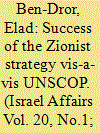

|
|
|
|
|
| Publication |
2014.
|
| Summary/Abstract |
The article examines the successful political strategies employed by Zionist diplomacy in the summer of 1947 vis-à-vis UNSCOP (the United Nations Special Committee on Palestine). The committee's recommendation of partition and the creation of a Jewish state on the majority of the territory between the Mediterranean and the Jordan River served as the basis for the UN partition resolution of 29 November 1947.The Zionist leaders made UNSCOP aware of their willingness to accept partition, but conditioned this on enlarging the territory of the future state. In this regard, the climax of their campaign, recounted in the article, was a secret and informal meeting between the senior echelons of the Jewish Agency and most members of UNSCOP on 14 July, an event that has been missed by historical research. The article describes the crucial influence of the Zionist message when UNSCOP came to formulate its conclusions and contributes to a better understanding of the process that led UNSCOP to its final recommendations.
|
|
|
|
|
|
|
|
|
|
|
|
|
|
|
|
| 7 |
ID:
182900
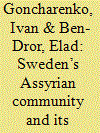

|
|
|
|
|
| Summary/Abstract |
This article examines attitudes within Sweden’s Assyrian community towards Israel, based on responses to a Swedish-language questionnaire distributed via the community’s electronic mailing list. The emergent picture is one of strong sympathy for the Jewish state, seen by respondents as a shining example of national self-determination based on the ingathering of the exiles – a dream nurtured by the world-dispersed small Assyrian nation. In addition, due to their deep animosity towards Turkey and the Arab states on account of their centuries-long persecution of the Assyrians, Swedish Assyrians tend to favour Israel in its feud with the Palestinians.
|
|
|
|
|
|
|
|
|
|
|
|
|
|
|
|
| 8 |
ID:
126325
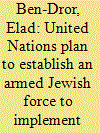

|
|
|
|
|
| Publication |
2013.
|
| Summary/Abstract |
On 29 November 1947, the United Nations General Assembly voted to partition Palestine into two independent states, Jewish and Arab, with Jerusalem as a corpus separatum under international control. The General Assembly then established the United Nations Palestine Commission to implement partition. Amongst other things, the Commission was to establish "armed militias" under UN supervision to help realise the plan. The analysis examines various aspects of the sequence of events related to this idea, from its conception in the General Assembly to its death in February 1948. It demonstrates that under the militia clause, the United Nations intended to rely on the Jews' main military organisation - the Haganah - to establish the Jewish state and shows how and why this plan went awry despite the converging interests of the Jews and the United Nations.
|
|
|
|
|
|
|
|
|
|
|
|
|
|
|
|
| 9 |
ID:
175433
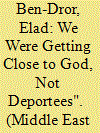

|
|
|
|
|
| Summary/Abstract |
In December 1992, Israel deported hundreds of Hamas activists to Lebanon. The deportees ensconced themselves at a camp near the village of Marj al-Zuhur, close to the Israeli border. Their sojourn there bolstered Hamas and became a milestone in its development. This article shows how the deportees' success in running the camp as an exemplary Islamic society turned the deportation into a foundational myth for the movement, one centered on nonviolent resistance in the spirit of Islamic values.
|
|
|
|
|
|
|
|
|
|
|
|
|
|
|
|
|
|
|
|
|